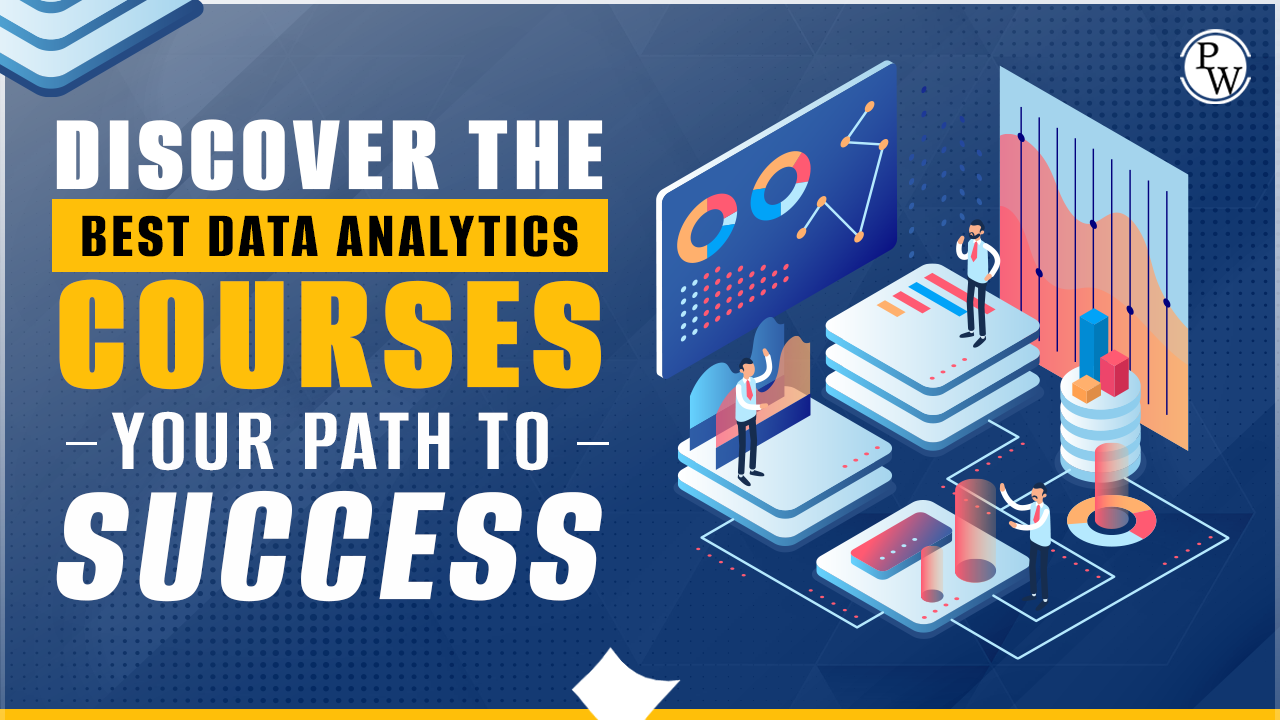Best Data Analytics Courses: Welcome to the world of data analytics, where opportunities abound and insights drive success! If you aspire to start a fulfilling career path in data analytics, you’ve landed in the right place. The best data analytics courses are your gateway to discovering the finest data analytics courses that can set you on success.
In this journey, we’ll unravel the exciting possibilities and help you choose the best data analytics course tailored to your ambitions and aspirations.
Mastering Full Stack Data Analytics from PW is a well-rounded course offering diverse courses for all kinds of learners – whether you’re just getting started or looking to take it to the next level. It’s an investment in yourself and a rewarding career path that will open doors for years. With dedication and utilizing these top educational opportunities, success awaits you! Now, let’s get learning!
What is Data Analytics?
Data analytics is like detective work with data. It helps people make smart decisions by examining information.
- Data analytics means studying data to get valuable insights.
- It’s great for businesses to perform better, make more money, and make wise choices.
- Computers and tools help us analyze data quickly and efficiently.
- Data analytics has different types, like figuring out what happened, why, what might happen next, or what we should do.

People use spreadsheets, data visualisation, and reporting tools for data analytics. It’s like using unique gadgets to solve data mysteries.
Analytical Methods in Data Analytics
Data analysts use various techniques to analyze data and gather insights. Here are some commonly used methods:
- Regression Analysis: This method examines how changes in one variable can affect another. It helps understand the relationship between different variables.
- Factor Analysis: It condenses a large dataset into a smaller one, aiming to uncover hidden patterns that might not be obvious in the original data.
- Cohort Analysis: Data is grouped into similar categories, often based on customer demographics. This allows for a deeper analysis of specific subsets of data.
- Monte Carlo Simulations: These model the likelihood of various outcomes, often used in risk assessment and forecasting. They consider multiple variables, providing robust predictions.
- Time Series Analysis: It involves tracking data over time to establish relationships between data points and occurrences. This is useful for identifying cyclical trends and making financial projections.
Also read: Comprehensive Data Analytics Syllabus: Explore Courses and Curriculum
Best Data Analytics Courses: Benefits of Becoming a Data Analyst
Becoming a data analyst by taking the best data analytics courses comes with several fantastic benefits:
- High Demand: Data analysts are in high demand across various industries. Many businesses rely on data to make informed decisions and need skilled professionals to analyze this data effectively.
- Lucrative Salary Packages: Data analysts often enjoy competitive salaries. With the increasing reliance on data-driven insights, companies are willing to pay well for proficient data analysts.
- Diverse Job Opportunities: Data analytics skills are versatile and can be applied in various fields such as marketing, healthcare, finance, sports, and more. This provides ample job opportunities and the flexibility to choose a field of interest.
- Problem-Solving Skills: The best data analytics courses teach you how to approach complex problems logically and derive insights from data. These problem-solving skills are helpful in analytics and transferable to various aspects of life and work.
- Contribution to Decision-Making: As a data analyst, you play a vital role in a company’s decision-making process. You are a crucial asset to the company because of how your analysis and insights affect business plans.
- Continuous Learning and Growth: New tools, technologies, and approaches are continually being introduced in the field of data analytics. Pursuing data analytics courses ensures you stay updated with the latest trends and advancements, promoting continuous learning and professional growth.
- Remote Work Opportunities: Data analytics often allows for remote or freelance work opportunities. This flexibility in work arrangements provides a better work-life balance and the freedom to work from anywhere.
- Impactful Career: Being a data analyst means your work influences crucial business decisions. Your insights can drive growth, optimize processes, and enhance efficiency and profitability.
In summary, opting for the best data analytics courses opens doors to a rewarding and dynamic career with the potential for personal and professional growth.
Also read: Comprehensive Data Analytics Syllabus: Courses and Curriculum
Best Data Analytics Courses: How to Select the Best One?
Here are some tips on selecting the best data analytics courses:
- Define Your Goals: Start by clarifying your career objectives. What specific area of data analytics are you interested in? Do you want to work in healthcare, finance, marketing, or another sector? Understanding your goals will help you choose a course that aligns with your ambitions.
- Course Content: Review the course content and curriculum. Ensure that the topics covered are relevant to your career aspirations. Look for courses that include both foundational and advanced concepts in data analytics.
- Instructors and Faculty: Check the credentials and experience of the instructors. Instructors with industry experience or academic expertise can provide valuable insights and guidance.
- Hands-On Experience: Practical experience is vital in data analytics. Opt for courses that offer hands-on projects and real-world case studies. This will help you apply your knowledge to actual data analysis scenarios.
- Certification: Consider whether the course offers a recognized certificate upon completion. Many employers value credentials as they validate your skills and knowledge.
- Flexibility: Assess the course format and schedule. Determine if it fits your current commitments and preferences. Some courses offer flexible plans or online learning options to accommodate working professionals.
- Cost and Value: Compare the cost of the course with the value it provides. A more expensive course may offer additional benefits or a recognized certification, but it should align with your budget.
- Networking Opportunities: Some courses provide opportunities to connect with instructors, peers, and industry professionals. Networking can benefit future job prospects and learn from others in the field.
- Research the Institution: If an educational institution offers the course, research the institution’s reputation and ranking in data analytics.
- Free Resources: Consider free or low-cost resources, like online courses or tutorials, to understand whether data analytics fits you before investing in a comprehensive course.
- Career Services: Find out if the course offers career services, such as job placement assistance or resume building. These services can be valuable in launching your career.
- Scalability: Ensure that the course caters to your current skill level, whether you’re a beginner or already have some background in data analytics.
- Reviews and Recommendations: Seek recommendations from professionals or academic advisors. They can guide you toward reputable courses.
Considering these factors, you can choose the best data analytics course that aligns with your goals and sets you on a path to a successful career in this dynamic field. Mastering Full Stack Data Analytics by PW is the best course for data analytics.
This course will give you the skills and knowledge to become a successful full-stack data analyst. Using cutting-edge technologies and approaches, you will learn how to collect, organize, process, analyze, and visualize data from different sources.
Why Choose Mastering Full Stack Data Analytics PW Course?
Choosing the “Mastering Full Stack Data Analytics PW Course” can be a game-changer for your career. Here are compelling reasons to consider this course:
- Comprehensive Curriculum: The course likely offers a comprehensive curriculum that covers all aspects of full-stack data analytics. You’ll gain a holistic understanding of the field, from data collection and processing to visualization and interpretation.
- Practical Hands-on Learning: Full-stack typically implies hands-on experience with every layer of the analytics process. This course may provide ample practical assignments, projects, or simulations to enhance your skills and confidence.
- Real-world Applications: Courses with a practical approach often expose you to real-world scenarios, giving you a taste of what you’ll encounter in a professional setting. This practical exposure is invaluable.
- Industry-Relevant Tools and Technologies: The course may cover a range of industry-relevant tools and technologies widely used in the data analytics field. Learning these tools equips you with various job opportunities.
- In-depth Data Visualization Skills: Understanding data is crucial, but presenting it effectively is equally important. A good course will emphasize data visualization, enabling you to communicate insights clearly and convincingly.
- Focus on Problem-Solving: A good course will emphasize problem-solving skills, teaching you how to approach complex data issues and derive meaningful solutions.
- Career Growth: Full-stack data analytics skills are in high demand. This course can significantly enhance your employability and open doors to many career opportunities and advancements.
- Networking Opportunities: If the course offers networking opportunities, you can connect with peers, instructors, and industry professionals. Networking can be instrumental in your career growth.
- Certification: Completing this course might earn you a valuable certification, adding weight to your resume and showcasing your commitment to mastering full-stack data analytics.
- Flexibility: Consider the course’s flexibility in scheduling and learning format. A course that fits well with your lifestyle and commitments ensures a better learning experience.
- Instructor Expertise: Courses led by experienced industry professionals or experts often provide valuable insights and tips based on real-world experiences.
- Testimonials and Reviews: Positive feedback and testimonials from past participants can validate the course’s quality and effectiveness.
- Value for Investment: Assess whether the course offers good value for your investment regarding the knowledge and skills gained and the potential career opportunities it unlocks.
In summary, choosing the “Mastering Full Stack Data Analytics PW Course” can equip you with the skills, knowledge, and practical experience needed to excel in the competitive field of data analytics. It’s a pathway to a fulfilling and rewarding career in a rapidly evolving industry.
Also read: Choosing the Right Data Analytics Platform for Your Business
What Skills Are Taught in Data Analytics Courses?
Data analytics courses teach various skills to prepare individuals for a successful career. These skills encompass a mix of technical, analytical, and soft skills to handle data and generate valuable insights effectively. Here are the essential skills typically covered in data analytics courses:
- Statistical Analysis: Understanding and applying statistical concepts and methods to accurately interpret data patterns and trends.
- Data Cleaning and Preparation: Learning techniques to clean, preprocess, and organize data to make it suitable for analysis.
- Data Mining and Analysis: Exploring methods to discover patterns, correlations, and insights from large datasets using statistical and machine learning techniques.
- Data Visualization: Creating meaningful and impactful visual representations of data using tools like Tableau, Power BI, or Python libraries like Matplotlib and Seaborn.
- Machine Learning Algorithms: Understanding various machine learning algorithms and their applications for predictive modeling and decision-making.
- Programming Languages: Gaining proficiency in programming languages such as Python and R, commonly used for data manipulation, analysis, and modeling.
- Database Management and SQL: Acquiring skills to manage databases and retrieve data efficiently using Structured Query Language (SQL).
- Big Data Technologies: Familiarity with big data frameworks like Hadoop and Spark for processing and analyzing large volumes of data.
- Domain Knowledge: Developing a deep understanding of domains like finance, healthcare, marketing, or e-commerce to tailor data analysis for industry-specific insights.
- Critical Thinking and Problem-Solving: Enhancing analytical thinking to approach problems logically and devise practical solutions based on data insights.
- Communication and Data Storytelling: Articulate findings concisely and compellingly to stakeholders through data storytelling and effective communication.
- Ethical and Legal Considerations: Understanding the ethical and legal aspects of handling data and ensuring compliance with data privacy and security regulations.
- Project Management: Learning to manage data analytics projects efficiently from initiation to completion, including task prioritization and timeline management.
- Collaboration and Teamwork: Cultivating the ability to work effectively in a team, sharing knowledge and expertise to achieve common data analytics goals.
Conclusion
Having a passion for data analytics and mastery of the subject matter can lead to a long and exciting career. Whether you’re starting from scratch or looking to sharpen your skills, there is a data analytics course offering the best path to success for you.
Physics Wallah’s Full Stack Data Analytics Course is a comprehensive program that offers all the training, mentorship, and support necessary for anyone eager to conquer big data analytics challenges.
With the help of experienced facilitators and top-notch instructors, this high-end learning program equips you with tools such as automation, design principles, deployment processes, and more.
So if you want to become an experienced data analyst who can efficiently manage data across sectors like finance, marketing, and media, master new technologies like machine learning, build impactful graphics, or crunch numbers on spreadsheets – PW’s advanced program can help develop needed skills quickly!
With PW’s Full Stack Data Analytics Course as your foundation, the experience will quickly follow, allowing you to launch a magnificently rewarding and successful journey into gaining insights from real-world data!
Best Data Analytics Courses: FAQ's
What Is Data Analytics, and Why Is It Important for Businesses?
Data analytics involves analyzing large data sets to extract valuable insights and trends. It helps businesses make informed decisions, improve operations, and gain a competitive edge by understanding customer behavior and market trends.
What Skills Are Taught in Data Analytics Courses?
The best data analytics courses teach various skills, including data processing, statistical analysis, data visualization, programming (Python, R, SQL), machine learning, and critical thinking. Effective communication and problem-solving skills are also emphasized.
What Are the Prerequisites for Enrolling in Data Analytics Courses?
Prerequisites vary, but a strong foundation in mathematics, statistics, and basic computer programming is beneficial. Many courses are designed for beginners, providing necessary foundational knowledge.
What Types of Data Analytics Courses Are Available?
Data analytics courses come in various formats: online or in-person, full-time or part-time, certificate programs, diploma courses, bachelor's or master's degrees, and specialized workshops. The choice depends on your level of commitment and desired depth of learning.
Are There Specializations within Data Analytics Courses?
Data analytics often includes business, healthcare, financial, and marketing specializations. Each specialization focuses on applying analytics in specific domains.
How Long Does It Take to Complete a Data Analytics Course?
The duration varies based on the type and depth of the course. Short courses or workshops might last a few weeks, while full-time master's programs can take up to two years. Online courses often allow for a flexible schedule, accommodating varying timeframes.
Do Data Analytics Courses Offer Hands-On Projects?
Many data analytics courses incorporate hands-on projects to apply theoretical knowledge to real-world scenarios. These projects enhance practical skills and provide a portfolio to showcase to potential employers.




